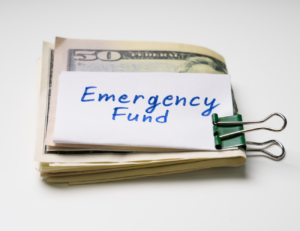
The Importance of an Emergency Fund
Having a solid financial safety net can make all the difference when unexpected expenses arise. One of the key pillars of financial stability is an emergency fund, which is a dedicated savings account that is specifically set aside to cover unforeseen expenses or emergencies. These could include medical bills, car repairs, job loss, or unexpected home repairs. Essentially, it’s your financial cushion to fall back on when life throws you a curveball.
Having an adequate emergency fund provides peace of mind. You won’t need to stress about how to cover unexpected expenses, which can reduce anxiety and help you stay focused on your long-term financial goals.
An emergency fund can also prevent you from accumulating high-interest debt when unexpected bills pile up. Instead of relying on borrowing money, you can use your savings to address the situation.
How Much Is Enough
Determining the right amount for your emergency fund can be challenging, as it depends on your unique financial situation and lifestyle. Here are some factors to consider:
- Monthly Expenses: Calculate your average monthly expenses, including rent or mortgage, groceries, utilities, and other essential costs. Aim to save at least three to six months’ worth of these expenses. For added security, you can save more if possible.
- Job Stability: Consider the stability of your job or source of income. If your job is less secure, you should plan for a larger emergency fund.
- Health and Insurance: If you have health issues or a high deductible on your health insurance, you might want a more substantial emergency fund to cover potential medical bills.
- Unforeseen Circumstances: Think about the types of emergencies that could occur in your life. Do you live in an area prone to natural disasters? Are you responsible for a pet’s unexpected veterinary bills? Account for these circumstances when setting your target amount.
Building Your Emergency Fund
When it comes to building your emergency fund, there are a couple tips and tricks that can help you dedicate money towards this fund without affecting your day-to-day activities.
- Budget: To start or replenish your emergency fund, you’ll need to budget and save a portion of your income regularly. Even small contributions over time can add up.
- Save Bonuses: Use unexpected financial windfalls, such as tax refunds or bonuses, to boost your emergency fund.
- Automatic Transfers: Consider setting up automatic transfers from your primary bank account to your emergency fund account to ensure consistent savings.
- Reevaluate and Adjust: As your financial situation changes, don’t forget to reevaluate your emergency fund goals and adjust your savings plan accordingly.
- Seek Professional Advice: As you start to build your emergency fund, there might be some savings opportunities you are missing. Reach out to financial experts at Firefighters Credit Union for advice and savings resources.
Don’t Wait for the Worst to Happen
Your emergency fund is your financial safety net, and it’s essential to ensure its sufficient to cover life’s unexpected twists and turns. Assess your individual needs, set clear savings goals, and work toward building or bolstering your emergency fund. It’s a vital component of financial security and peace of mind.
Remember that emergencies can happen to anyone, and having a well-funded emergency fund can make these challenging times more manageable. Start taking steps today to secure your financial future by ensuring your emergency fund is sufficient. Stop in at one of our Firefighters Credit Union locations in La Crosse, Holmen, or Onalaska to speak with one of our financial experts to start saving today.


